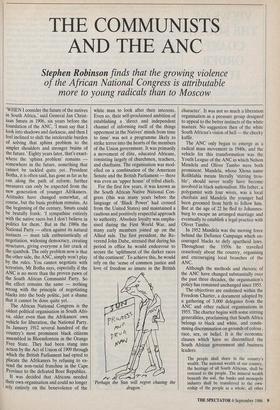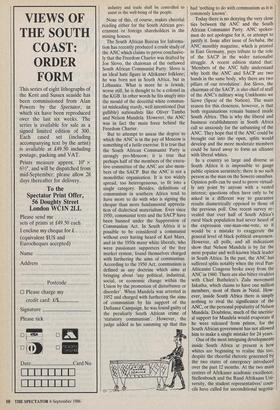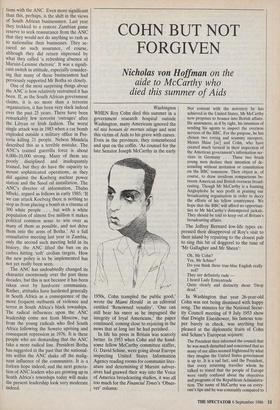THE COMMUNISTS AND THE ANC
Stephen Robinson finds that the growing violence
of the African National Congress is attributable more to young radicals than to Moscow
`WHEN I consider the future of the natives in South Africa,' said General Jan Christ- iaan Smuts in 1906, six years before the foundation of the ANC, 'I must say that I look into shadows and darkness, and then I feel inclined to shift the intolerable burden of solving that sphinx problem to the ampler shoulders and stronger brains of the future.' Eighty years later, that's exact- where the 'sphinx problem' remains somewhere in the future, something that cannot be tackled quite yet. President Botha, it is often said, has gone as far as he can along the path of reform; further measures can only be expected from the new generation of younger Afrikaners. Attitudes have changed somewhat, of course, but the basic problem remains. At the beginning of the century, Smuts could be brutally frank: 'I sympathise entirely with the native races but I don't believe in politics for them.' But in the 1980s the National Party — often against its natural instincts — must talk enthusiastically of negotiation, widening democracy, creating structures, giving everyone a fair crack of the sjambok. The only problem now is that the other side, the ANC, simply won't play by the rules. You cannot negotiate with terrorists, Mr Botha says, especially if the ANC is no more than the proven pawn of the South African Communist Party. So the effect remains the same — nothing wrong with the principle of negotiating blacks into the body politic, just a shame that it cannot be done quite yet.
The African National Congress is the oldest political organisation in South Afri- ca, older even than the Afrikaners' own vehicle for liberation, the National Party. In January 1912 several hundred of the country's most prominent black citizens assembled in Bloemfontein in the Orange Free State. They had been stung into action by the Act of Union of 1909 through which the British Parliament had opted to placate the Afrikaners by refusing to ex- tend the non-racial franchise in the Cape Province to the defeated Boer Republics.
It was decided that Africans needed their own organisation and could no longer rely entirely on the benevolence of the white man to look after their interests. Even so, their self-proclaimed ambition of establishing a 'direct and independent channel of informing itself of the things uppermost in the Natives' minds from time to time' was not a programme likely to strike terror into the hearts of the members of the Union government. It was primarily a movement of elite, educated Africans, consisting largely of churchmen, teachers, and chieftains. The organisation was mod- elled on a combination of the American Senate and the British Parliament — there was even an 'upper house' of tribal chiefs.
For the first few years, it was known as the South African Native National Con- gress (this was many years before the language of 'Black Power' had crossed from the United States) and maintained a cautious and positively respectful approach to authority. Absolute loyalty was empha- sised during the First World War, and many early members joined up on the Allied side. The first president, the Re- verend John Dube, stressed that during his period in office he would endeavour to secure the `upliftment of the darker races of the continent'. To achieve this, he would rely on the 'sense of common justice and love of freedom so innate in the British `Perhaps the Sun will regret chasing the dragon.' character'. It was not so much a liberation organisation as a pressure group designed to appeal to the better instincts of the white masters. No suggestion then of the white South African's vision of hell — the cheeky kaffir.
The ANC only began to emerge as a radical mass movement in 1940s, and the vehicle for this transformation was the Youth League of the ANC in which Nelson Mandela and Oliver Tambo were both prominent. Mandela, whose Xhosa name Rolihlahla means literally 'stirring trou- ble', should never really have become involved in black nationalism. His father, a polygamist with four wives, was a local chieftain and Mandela the younger had been groomed from birth to follow him. But at the age of 22 he fled to Johannes- burg to escape an arranged marriage and eventually to establish a legal practice with Oliver Tambo.
In 1952 Mandela was the moving force behind the Defiance Campaign which en- couraged blacks to defy apartheid laws. Throughout the 1950s he travelled ceaselessly about the country, organising and encouraging local branches of the ANC.
Although the methods and rhetoric of the ANC have changed substantially over the past three decades, the organisation's policy has remained unchanged since 1955.
The objectives are enshrined within the Freedom Charter, a document adopted by a gathering of 3,000 delegates from the ANC and other radical organisations in 1955. The charter begins with some stirring generalities, proclaiming that South Africa belongs to black and white, and conde- mning discrimination on grounds of colour, race, sex, or belief. It is the economic clauses which have so discomfited the South African government and business leaders:
The people shall share in the country's wealth. The national wealth of our country, the heritage of all South Africans, shall be restored to the people. The mineral wealth beneath the soil, the banks and monopoly industry shall be transferred to the own- ership of the people as a whole; all other industry and trade shall be controlled to assist in the well-being of the people.
None of this, of course, makes cheerful reading either for the South African gov- ernment or foreign shareholders in the mining houses.
The South African Bureau for Informa- tion has recently produced a crude study of the ANC which claims to prove conclusive- ly that the Freedom Charter was drafted by Joe Slovo, the chairman of the outlawed South African Communist Party. Slovo is an ideal hate figure in Afrikaner folklore; he was born not in South Africa, but in Lithuania. What is more he is Jewish; worse still, he is thought to be a colonel in the KGB. In other words he fits snugly into the mould of the deceitful white commun- ist misleading sturdy, well intentioned (but gullible) nationalists like Oliver Tambo and Nelson Mandela. However, the ANC was in fact the main force behind the Freedom Charter.
But to attempt to assess the degree to which the ANC is in the pay of Moscow is something of a futile exercise. It is true that the South African Communist Party is strongly pro-Moscow; it is true that perhaps half of the members of the execu- tive committee of the ANC are also mem- bers of the SACP. But the ANC is not a monolithic organisation. It is too widely spread, too heterogeneous, to fit into a single category. Besides, definitions of communism in southern Africa tend to have more to do with who is signing the cheque than more fundamental apprecia- tion of dialectical materialism. Ever since 1950, communist texts and the SACP have been banned under the Suppression of Communism Act. In South Africa it is possible to be considered a communist without ever having heard of Karl Marx, and in the 1950s many white liberals, who were passionate supporters of the free market system, found themselves charged with furthering the aims of communism. According to the 1950 Act, communism is defined as any doctrine which aims at bringing about 'any political, industrial, social, or economic change within the Union by the promotion of disturbance or disorder'. When Mandela was arrested in 1952 and charged with furthering the aims of communism by his support of the Defiance Campaign, he was found guilty of the peculiarly South African crime of `statutory communism'. However, the judge added in his summing up that this had 'nothing to do with communism as it is commonly known'.
Today there is no denying the very close ties between the ANC and the South African Communist Party. ANC spokes- men do not apologise for it, or attempt to justify it. Issue after issue of Sechaba, the ANC monthly magazine, which is printed in East Germany, pays tribute to the role of the SACP in the wider nationalist struggle. A recent edition stated that: `Members of the ANC fully understand why both the ANC and SACP are two hands in the same body, why there are two pillars of our revolution'. Joe Slovo, the chairman of the SACP, is also chief of staff of the ANC's military wing Umkhonto we Sizwe (Spear of the Nation). The main reason for this closeness, however, is that both organisations remain banned inside South Africa. This is why the liberal and business establishments in South Africa call so anxiously for the unbanning of the ANC. They hope that if the ANC could be brought out into the open, splits would develop and the more moderate members could be lured away to form an alliance with liberal whites.
In a country so large and diverse as South Africa it is impossible to gauge public opinion accurately; there is no such person as the man on the Soweto omnibus. Opinion polls can be used to prove virtual- ly any point by anyone with a vested interest; questions often have only to be asked in a different way to guarantee results diametrically opposed to those of the previous poll. One recent survey re- vealed that over half of South Africa's rural black population had never heard of the expression one-man-one-vote, so it would be a mistake to exaggerate the general level of black political awareness. However, all polls, and all indications show that Nelson Mandela is by far the most popular and well-known black leader in South Africa. In the past, the ANC has suffered splits notably when the rival Pan- Africanist Congress broke away from the ANC in 1960. There are also bitter rivalries with Chief Buthelezi's Zulu movement Inkatha, which claims to have one million members, most of them in Natal. How- ever, inside South Africa there is simply nothing to rival the significance of the ANC, or the personal popularity of Nelson Mandela. Doubtless, much of the uncritic- al support for Mandela would evaporate if he were released from prison, for the South African government has not allowed him to make a single mistake for 24 years. One of the most intriguing developments inside South Africa at present is how whites are beginning to realise this too, despite the cheerful rhetoric generated by the two states of emergency introduced over the past 12 months. At the two main centres of Afrikaner academic excellence, Stellenbosch and the Rand Afrikaans Uni- versity, the student representatives' coun- cils have called for unconditional negotia- tions with the ANC. Even more significant than this, perhaps, is the shift in the views of South African businessmen. Last year they trekked to a remote Zambian game reserve to seek reassurance from the ANC that they would not do anything so rash as to nationalise their businesses. They se- cured no such assurance, of course, although they did return impressed by what they called 'a refreshing absence of Marxist-Leninist rhetoric'. It was a signifi- cant switch in attitude, especially consider- ing that many of these businessmen had previously supported Mr Botha so closely.
One of the most surprising things about the ANC is how relatively restrained it has been. If, as the South African government claims, it is no more than a terrorist organisation, it has been very slack indeed over the past 25 years. There have been remarkably few terrorist 'outrages' after the Libyan or Irish fashion. The worst single attack was in 1983 when a car bomb exploded outside a military office in Pre- toria killing 21 people. Nelson Mandela described this as a terrible mistake. The ANC's trained guerrilla force is about 6,000-10,000 strong. Many of them are poorly disciplined and inadequately trained, but they do have the capacity to mount sophisticated operations, as they did against the Koeberg nuclear power station and the Sasol oil installation. The ANC's director of information, Thabo Mbeki, argued as follows in early 1985: 'If we can attack Koeberg there is nothing to stop us from placing a bomb in a cinema of 300 white people . . but with a white population of almost five million it makes political common sense to win over as many of them as possible, and not drive them into the arms of Botha.' At a full consultative meeting last year in Zambia, only the second such meeting held in its history, the ANC lifted the ban on its cadres hitting `soft' civilian targets. How the new policy is to be implemented has not yet really been seen.
The ANC has undoubtedly changed its character enormously over the past three decades, but this is not because it has been taken over by hard-core communists. Rather, attitudes have hardened generally in South Africa as a consequence of the more frequent outbursts of violence and terror in South Africa's black townships. The radical influences upon the ANC leadership come not from Moscow, but from the young radicals who fled South Africa following the Soweto uprising and consequent repression in 1976. It is these people who are demanding that the ANC take a more radical line. President Botha has suggested in the past that the national- ists within the ANC shake off the malig- nant influence of the communists. It is a forlorn hope indeed; and the next genera- tion of ANC leaders who are growing up in South Africa's townships today will make the present leadership look very moderate indeed.








































 Previous page
Previous page